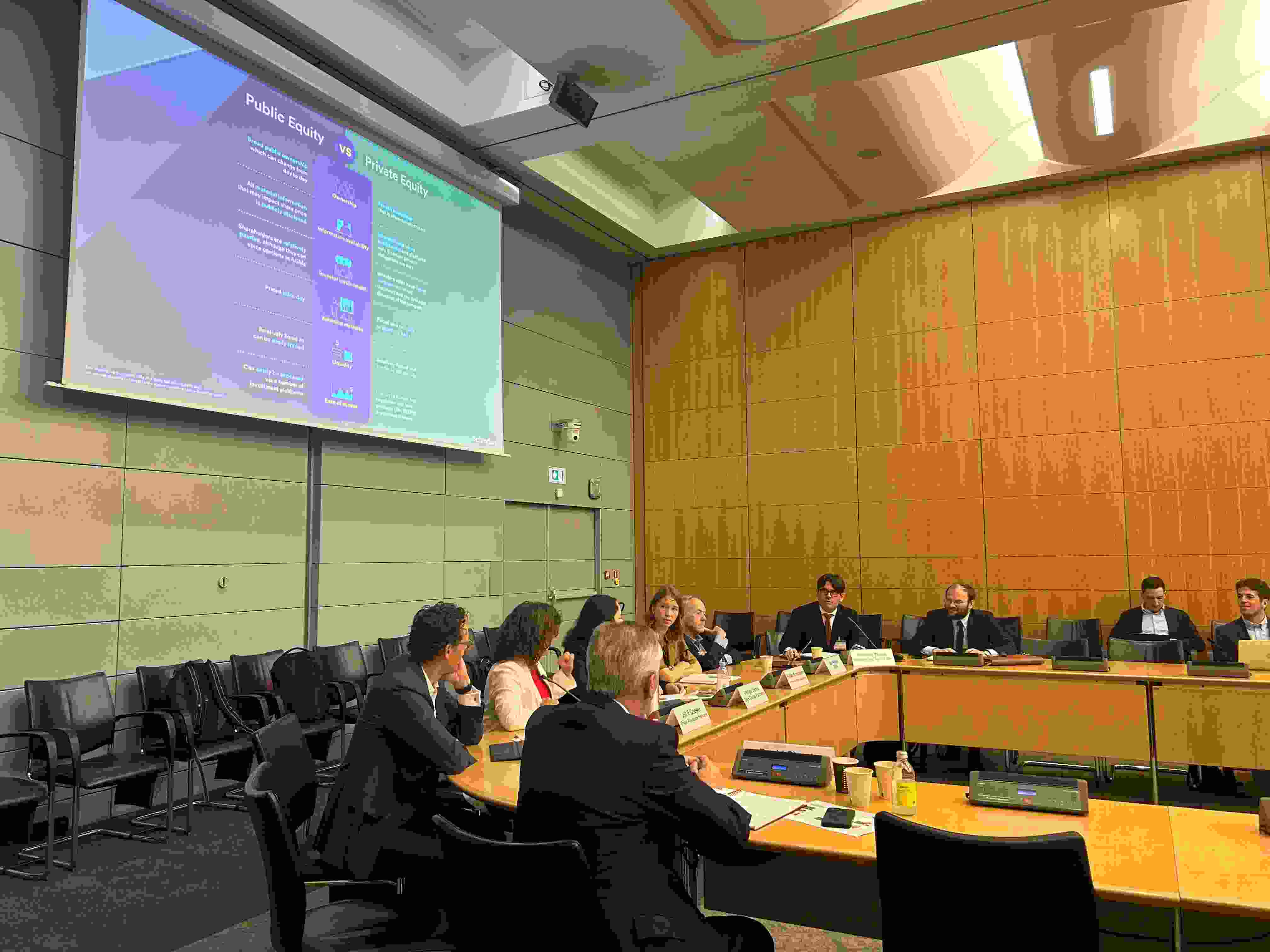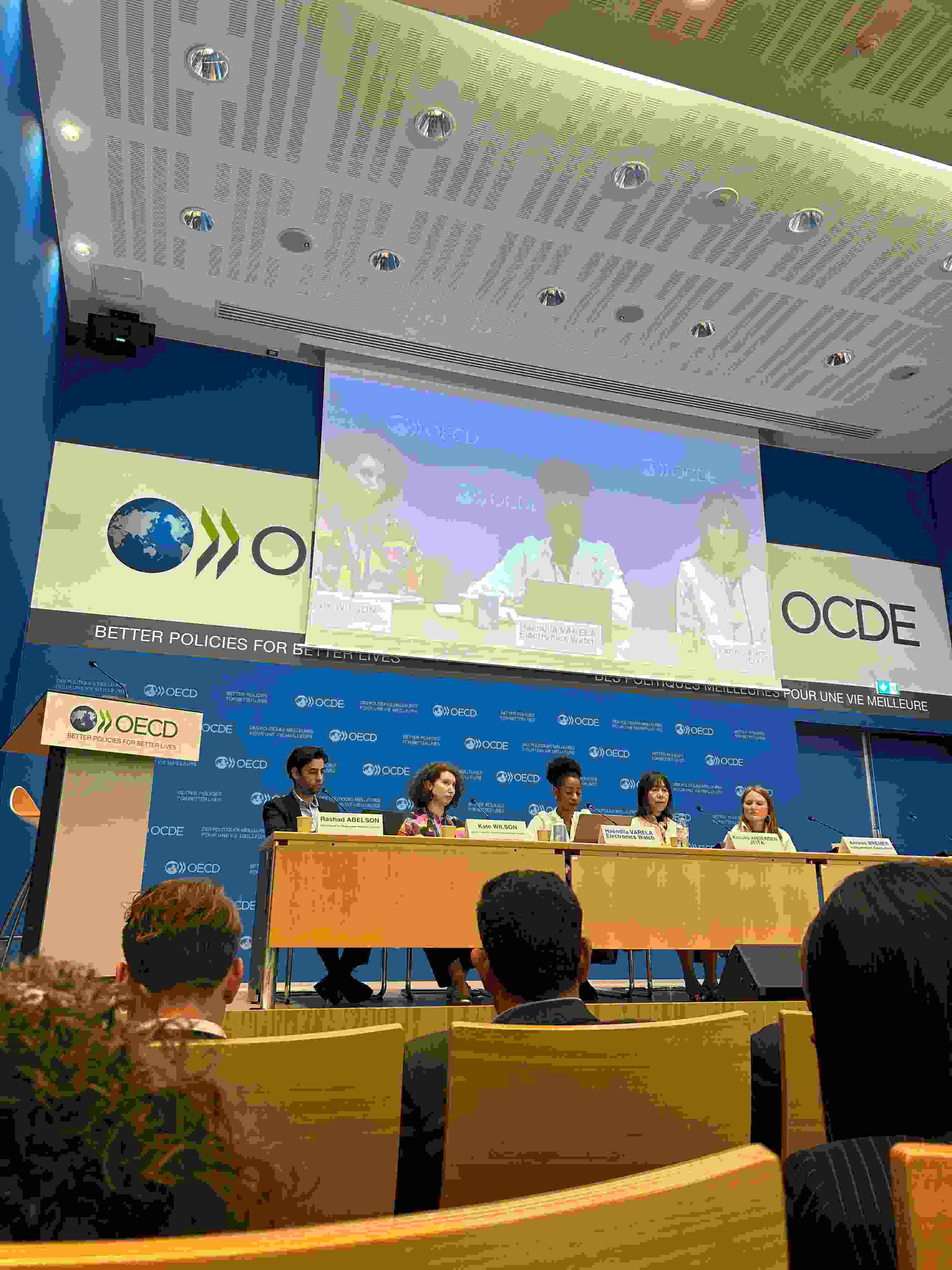Traceable & Sustainable Mineral Supply
18th OECD Forum on Responsible Mineral Supply Chains
13 May 2025
Global mineral supply chains are entering a new era, driven by digital traceability, ESG integration, and ASM integration
From 5 to 7 May 2025, SFA (Oxford) had the privilege of attending and actively participating in the 18th OECD Forum on Responsible Mineral Supply Chains, held in Paris. Our team was present throughout the three-day programme, engaging in every session and contributing to the dialogue shaping the future of responsible mineral sourcing.
We were pleased to be part of a global community working towards more transparent, ethical, and sustainable mineral supply chains. The forum provided valuable insight into emerging regulatory trends, technological developments, and collaborative strategies across the value chain. Below, we share our key takeaways from this important industry event.

Participants in a panel discussion at the OECD Responsible Mineral Supply Chains Forum 2025 (Paris).
Paris hosted the 18th OECD Forum on Responsible Mineral Supply Chains, drawing more than a thousand officials, industry leaders and NGO representatives. The three-day conference underscored the growing urgency of clean-energy minerals – from critical battery metals to rare earths – and the need for transparency, sustainability and shared benefits. Attendees noted that themes such as supply chain transparency and traceability, the due diligence role of commodity traders, coherence among ESG standards, and artisanal-mining formalization dominated the agenda. One industry observer remarked that conversations about “ethical sourcing, transparency, and critical mineral security” reflected how cutting-edge technology (e.g. AI-driven risk tools) is being applied to identify forced labor and other risks in global supply chains. In sum, participants left energized by the high-level dialogue and interactive sessions connecting governments, companies and communities on these urgent challenges.
Strengthening supply-chain traceability and digital tools
Building reliable traceability systems emerged as a core priority. Experts agreed that tracking minerals through multi-tiered supply chains remains difficult, but essential for credible due diligence. OECD analysts emphasized that traceability is a valuable tool – not a substitute for overall risk management – and stressed moving beyond mere data collection to concrete action. An IEA-OECD report noted that robust traceability supports multiple goals (due diligence, national security, circularity) and relies on four key elements: interoperable data systems, shared infrastructure, collaboration and governance. China’s trade association described evolving national due-diligence guidelines aligned with global schemes like the RMI, highlighting the need for upstream coordination and international platforms to strengthen traceability.
Downstream manufacturers also weighed in. A European tech executive quipped that supply-chain mapping can feel like the “five stages of grief” – given the many hidden tiers of sourcing. He called for cross-functional collaboration (including suppliers and buyers), common data standards, and pragmatic tools to help smaller firms comply. Industry speakers pointed out initiatives such as the Solar Stewardship traceability standard for solar-grade polysilicon and urged site-level certifications (e.g. OECD audits) to bridge gaps between mine sites and end-users. One mine-trace expert noted a “critical gap” persists between smelters and end-users: he urged downstream companies to engage in local tracking programs, rely on trusted local structures, and avoid fragmenting standards – reiterating that honest, multi-stakeholder effort is key to whole-chain transparency.
-
Key practices for traceability: Participants recommended that governments support interoperable digital platforms (e.g. common registries or blockchain tools) with clear policy goals and incentives. Companies should share supplier data and align on reporting formats, while auditors and NGOs help validate data. Industry leaders said that building “resilient” supply chains requires coordination beyond tier-1 suppliers, ensuring even small-scale producers are linked into traceability initiatives. In short, improved traceability depends on technology and on governance and collaboration.
Evolving ESG and regulatory alignment
The forum stressed the convergence of environmental, social and governance (ESG) frameworks with new regulations. Speakers noted that ESG metrics must be deeply integrated into due diligence, not treated as an optional add-on. In her remarks, an OECD delegate pointed out that many companies mention gender and social criteria in public commitments, but few actually embed them into risk management; similarly, ESG-related training, reporting and grievance mechanisms remain underdeveloped. Industry and civil society urged more rigorous ESG reporting, especially on human rights.
On the policy side, officials outlined recent initiatives. For example, the EU’s new Critical Raw Materials Act (CRMA) was cited as a model for diversifying suppliers and strengthening local value chains, with built-in ESG and traceability requirements. OECD officials and partners (Basel Institute, UNCTAD) highlighted efforts to build a global integrity framework: a recent UN panel recommended a single accountability framework across the energy-transition minerals value chain, and proposed alignment of national due-diligence laws (like the EU’s Corporate Sustainability Due Diligence Directive and emerging US forced-labor rules) with the OECD Guidance. At one session on corruption and green minerals, experts drew on case studies (Bolivia, Indonesia, Ukraine) to discuss how to incorporate anti-corruption safeguards into traceability and due diligence.
-
Regulatory trends: Speakers underscored that legal mandates are tightening worldwide. Panelists pointed to the need for companies to prepare for laws like the EU’s CSDDD and new US import rules targeting child/forced labour – and to align them with industry standards. One commentator described “regulatory readiness” as staying ahead of evolving mandates by harmonizing compliance across markets. Similarly, international bodies like the IGF and OECD emphasized that consistent global rules and joint evaluations (e.g. of OECD audits or EITI reports) can help de-risk investments in minerals. In practice, firms noted that participating in voluntary schemes (IRMA, Copper Mark, Solar Stewardship) provides a roadmap for meeting both ESG expectations and new regulations over time.

A high-level panel session at the OECD forum, featuring OECD, UN and NGO speakers.
Artisanal and small-scale mining (ASM) formalisation
Day 3 spotlighted the vital (and often overlooked) role of artisanal and small-scale miners. Many delegates insisted that ASM workers must be included in responsible sourcing, not excluded by rigid rules. The OECD’s agenda explicitly focused on ASM initiatives that drive formalization. Civil society speakers described on-the-ground realities: for instance, women in ASM communities in Zambia face disproportionate risks (only 17% of mine owners are female), and conventional audits often miss culturally-embedded gender issues. ActionAid and other groups presented projects from the Copperbelt aimed at formalizing ASM sites, improving work conditions and expanding market access for small producers.
Industry attendees added that midstream companies are starting to support ASM. One metals refiner shared how it is developing an app to help artisanal miners formalize operations, report on gender-inclusion and prevent violence in the field. Stakeholders agreed that flexible, locally-tailored approaches are needed: ASM programmes must build local technical capacity (geology, business skills, cooperative governance) and help integrate miners into legal supply channels. Several speakers warned that fast-tracking large mining projects without considering ASM would be counterproductive. Instead, the forum emphasized inclusive supply chain models and gender-responsive due diligence – in line with a 5-year OECD/Women’s Rights & Mining commitment.
-
ASM best practices: Key messages included the need for clear ASM national strategies, reasonable taxation, and multi-stakeholder “market access” programs for small miners. Programs should combine registration, technical training and community consultations. Civil society urged that ASM formalization must come with social safeguards (health, land rights, child protection) and respect for Free, Prior and Informed Consent (FPIC) in indigenous areas. In short, formalizing ASM was framed not just as a compliance step, but as an opportunity to lift communities and make supply chains more equitable.
Navigating high-risk regions
Many forum sessions addressed the challenges of sourcing from conflict-affected and environmentally sensitive areas. NGOs reported on new findings of abuse: for example, Global Witness noted that its investigations of DRC’s east showed warzone tin and tungsten still reaching Europe via traders – a scandal referenced even by DRC’s Vice Minister for Mines at the forum. Another session heard about Myanmar’s toxic mining boom: partners from the region described how heavy rare earth extraction in Kachin state has devastated forests and contaminated water, causing serious health problems for downstream communities. These examples underscored that mineral security and human rights are linked.
Participants discussed technical and policy responses. For the DRC and Great Lakes minerals (3Ts), speakers shared early impact data: an OECD analysis found areas covered by the ITSCI chain-of-custody program saw a 60% drop in conflict incidents, though experts cautioned that proving direct causality is difficult. In broader terms, delegates stressed that companies and governments must invest more in environmental due diligence in mining hotspots – similar to how tropical deforestation is regulated. The idea of including climate impact in mineral scrutiny gained traction: e.g. NGOs noted efforts at COP30 to get mining impacts recognized in climate negotiations.
-
Risk-focused strategies: Takeaways included reinforcing multi-lateral monitoring in high-risk areas (e.g. joint military patrols or satellite oversight) and expanding due diligence to cover environmental pollution. Speakers also called for stronger whistleblower and community grievance mechanisms in mining regions. They emphasized that transparency is the foundation: for instance, disclosing smelter inputs or requiring upstream reform (as some countries do) helps reduce illicit trade. In summary, participants urged that responsible sourcing initiatives must account for the “full picture” – conflict, health, corruption and climate risks alike – in order to avoid repeating past injustices under the banner of the clean-energy transition.
Technology and digital innovation
Digital tools and data platforms were highlighted as game-changers in due diligence. Multiple speakers described how AI, blockchain and satellite monitoring are being deployed to flag risks in mineral flows. An ESG tech consultant celebrated sessions that showcased AI-driven systems capable of mapping opaque supply chains and detecting forced-labor patterns in real time. Panelists noted pilot projects using machine learning to match import data with company disclosures, as well as blockchain pilots for cobalt and gold traceability. There was consensus that while technology alone cannot guarantee ethical sourcing, it can greatly expand transparency and efficiency.
At the same time, companies cautioned that tech must be paired with capacity-building. For example, traders and banks discussed a new cloud-based due diligence platform (being co-developed by OECD and industry) that aggregates supplier information and flags compliance issues. Meanwhile, a semiconductor equipment maker explained how traceability tools are being integrated into battery and electronics production lines. These examples spurred dialogue on data interoperability: speakers encouraged adopting shared digital standards (APIs, data schemas) so that different tools “speak the same language.” Governments and funders were urged to support open-source data infrastructures and training, to ensure small producers can participate in the digital evolution of due diligence.
-
Tech priorities: Participants agreed on a few practical steps – invest in standardized data protocols, pilot new verification tools (e.g. drone or satellite imagery), and build public-private data collaboratives. One key idea was that traceability solutions should be modular and scalable, so that artisanal cooperatives and informal miners can upload information via simple smartphone apps. The message was clear: innovative digital solutions are now “mission-critical” for mapping complex mineral chains and meeting stricter regulations.
Collaboration across stakeholders
A consistent theme was that no single actor can achieve responsible sourcing alone. Attendees from companies, NGOs and governments emphasized that partnerships are essential. For instance, a multi-stakeholder “China–Africa Business Integrity” dialogue illustrated this: Chinese mining firms, industry auditors and African civil society groups met (with OECD support) to discuss challenges of community engagement and rule-of-law in Africa. Similarly, an IRMA (Responsible Mining) workshop brought together mining companies, auditors and local NGOs to debate strengthening voluntary mining standards – a reminder that industry and civil society must co-create accountability mechanisms.
Government representatives and IGOs also stressed coordination. The Intergovernmental Forum on Mining (IGF) pointed out that its 86 member countries (supplying ~80% of critical minerals) are moving to be “long-term partners” rather than raw-material donors. The OECD and EU noted that regulators from different regions are actively sharing experiences – for example, the EU’s Global Gateway strategy on supply chains dovetails with African Continental Free Trade Area ambitions. One high-level panel noted that too often policy efforts are fragmented: experts called for harmonized global rules on due diligence, to prevent a patchwork of standards that confuses companies and undermines governance.
-
Building coalitions: Key takeaways were to invest in joint initiatives that bridge sectors. Suggested actions included expanding peer-learning networks (for example, pairing a mining ministry with an environmental NGO on policy design) and creating more tripartite forums at regional levels. Many speakers praised the OECD’s role as a neutral convener: it was agreed that ongoing monitoring (such as the OECD’s impact evaluations and the EITI’s supply-chain tools) should involve all stakeholders. In the words of one attendee, responsible mineral sourcing “is not just a technical process, it is a political, ethical and economic imperative” – requiring dialogue and trust among governments, companies and communities.
In closing, participants of the 2025 OECD forum were optimistic that this high-profile dialogue will translate into action. Across sessions, the message was clear: achieving sustainable mineral supply chains will demand transparency, innovation, and above all, coordinated effort among buyers, miners, financiers and local citizens. The diverse takeaways – from enhanced traceability tools to new public-private partnerships – highlight that the industry’s transformation is well underway, even if significant challenges remain


Meet the Sustainability and ESG Team
Trusted advice from a dedicated team of experts.

Henk de Hoop
Chief Executive Officer

Beresford Clarke
Managing Director: Technical & Research

Dr Jenny Watts
Critical Minerals Technologies Expert

Jamie Underwood
Principal Consultant

Ismet Soyocak
ESG & Critical Minerals Lead

Lakshya Gupta
Senior Market Analyst: Battery Materials and Technologies

Dr Ralph Grimble
Operations Director

Thomas Chandler
Principal Lithium Supply Analyst

Rj Coetzee
Senior Market Analyst: Battery Materials and Technologies

Alex Biddle
Senior Mining Analyst

David Mobbs
Head of Marketing
Brought to you by

Ismet Soyocak
ESG & Critical Minerals Lead

How can we help you?
SFA (Oxford) provides bespoke, independent intelligence on the strategic metal markets, specifically tailored to your needs. To find out more about what we can offer you, please contact us.
